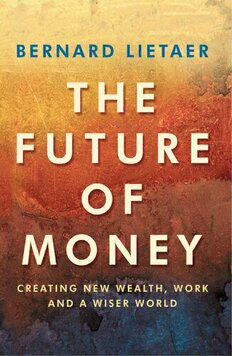
The Future Of Money: Beyond Greed and Scarcity PDF
02013·2.738 MB·English
Most books are stored in the elastic cloud where traffic is expensive. For this reason, we have a limit on daily download.
Preview The Future Of Money: Beyond Greed and Scarcity
Description:
Based on the four mega-trends of monetary instability, global greying (an ageing global population), the information revolution, and climate change and species extinction, Bernard Lietaer looks at different scenarios of what the world might be like in 2020. 1. The Corporate Millennium: governments are disbanded, central banks close down and the world is run with Big Brother control by huge corporations with their own currencies. 2. Caring Communities: people retreat into small, self-sustaining communities, like tribes. 3. Hell on Earth: in which the breakdown of life as we know it is followed by a highly individualistic free-for-all, resulting in an ever more obscene gulf between rich and poor. 4. Sustainable Abundance: envisages a world where we take better care of the environment, re-engage the poor and the unemployed in mainstream society and give back time and fulfilment to the over-worked, while providing the elderly with a high level of personal care. A society of sustainable abundance is achievable - but only if we are willing to re-invent our money system and create new currencies.Published by Random House in 2001, and currently out of print, it was written as an overview of how money and the financial system works, the effects of modern money paradigms, especially relating to debt and interest, and how it can work to everyone's benefit to solve a wide range of problems, especially with the use of complementary currencies.[1] The book is meant to be written for the layperson, while bringing light to subjects that only relatively few are aware of at all levels of society.Lietaer gives examples of different currencies that have been used in the past or are being used today, and his assessment of the positive and negative effects they carry. He writes that while the modern money paradigm has both positive and negative consequences (e.g. that it induced industrialisation), these currencies can exist in complement at the local, regional and international levels, as well as there being currencies for various sectors, such as healthcare. Lietaer writes that in order to optimally solve problems and create a healthy society, the world needs a variety of currencies in our "toolbox", and that otherwise we are "painting with a screwdriver".
See more
The list of books you might like
Most books are stored in the elastic cloud where traffic is expensive. For this reason, we have a limit on daily download.
